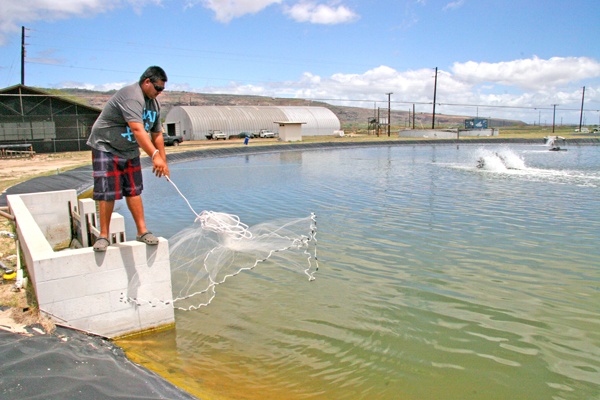LIHU‘E — First, it was the seabirds that got the shrimp sick at Kekaha’s shrimp farm, and the county paid for it — to the tune of $250,000. Now, it’s the erosion threatening the shrimp hatchery, and the shrimp farm
LIHU‘E — First, it was the seabirds that got the shrimp sick at Kekaha’s shrimp farm, and the county paid for it — to the tune of $250,000. Now, it’s the erosion threatening the shrimp hatchery, and the shrimp farm is asking the state government to pay more than five times for it.
The original version of a bill progressing at the state Legislature would give the shrimp farm owner, Sunrise Capital, up to $1.3 million in state special purpose revenue bonds to protect the company’s hatchery facility and its salt water well, relocating them further inland to avoid shoreline erosion.
Rep. Dee Morikawa, D-16th District, who introduced House Bill 1388, said the bill does not outright give money to the company.
“It’s not giving them money, it allows them to apply for bonds … if they need the money,” she said. “It’s a financial tool.”
Language in the bill, however, could be interpreted otherwise.
“The (state) Department of Budget and Finance, with the approval of the governor, is authorized to issue special purpose revenue bonds in a total amount not to exceed $1,300,000 in one or more series, for the purpose of assisting Sunrise Capital Inc. … in the planning, design and construction of a two-phase project that will protect its shrimp hatchery facility,” the proposed legislation states.
The bill passed the House Agriculture Committee unamended. But when it went through the House Finance Committee, the monetary amount was removed.
Morikawa said monetary amounts are removed when bills go through the Finance Committee, because they don’t know “what the picture is going to be like at the end of the session.”
On Tuesday, the bill passed third reading at the House and sent to the Senate. On Wednesday, the Senate referred it to its Agriculture and Ways and Means committees.
At the Senate, a monetary amount may be negotiated and put back into the bill, according to Morikawa.
“But that’s a lot of money, initially, that (Sunrise Capital) said they might need,” she said.
Department of Budget and Finance Director Kalbert Young sent testimony saying the department had no position. But he reminded lawmakers if the proposal is approved, approval of bonds issuance would still require further discussion and review of the transaction’s financing components.
First county, now state
On Oct. 30, 2009, Sunrise Capital reached a settlement in a lawsuit against the County of Kaua‘i, in which the company was to receive up to $250,000 from the county to cover the shrimp tanks with netting to protect against seabirds.
The company alleged seabirds ate imported frozen shrimp that had been disposed off at the nearby landfill. The imported shrimp were allegedly contaminated with white spot syndrome virus, lethal for shrimp, but not harmful for humans.
The birds then flew to the shrimp farm, to hang out at the tanks, a known source of food for them. Since the virus would have died going through the birds’ intestines, the birds likely threw up in the tanks, contaminating the shrimp there, according to the company.
Now, Sunrise Capital President James Sweeney is asking state lawmakers to protect the farm’s hatchery, which provide for more than 80 percent of the company’s revenues.
“The continued success of our business is highly dependent on the ability to breed, culture, pack and ship live marine shrimp broodstock from our hatchery facility,” Sweeney said in his testimony.
Constitutionality
House Bill 1388 boldly cites Sunrise Capital as the beneficiary of the bonds, something that may be unusual — past bills addressing the Superferry spoke of large vessels, and a current bill helping Kaua‘i Island Utility Cooperative mentions only electric cooperatives in the state.
Additionally, the Hawai‘i Constitution allows special purpose revenue bonds to be authorized or issued to seven types of organizations. The only one that Sunrise Capital may be able to fit may be “manufacturing, processing or industrial enterprise.”
The seventh type of organization allowed is “agricultural enterprise serving important agricultural lands.” But IAL designation plans are not complete, and neither the state nor the county of Kaua‘i consider aquaculture a criteria for IAL designation.
However, a separate proposal, House Bill 748, would amend the state constitution to add “agricultural enterprise” as the eighth type of organization allowed to receive such bonds.
In any case, Morikawa is saying she doesn’t believe the proposal is unconstitutional.
“Not in this instance, if that was not constitutional, that would have been declared a long time ago,” she said. “The Attorney General doesn’t allow bills to go through if it’s not constitutional.”
• Léo Azambuja, staff writer, can be reached at 245-0452 or lazambuja@ thegardenisland.com.


